CBO on Selling Excess Federal Property
Many of the fiscal plans produced over the last several months -- including the Gang of Six plan and the President’s budget -- propose selling excess federal property to help reduce our nation’s debt (see CRFB’s Comparison Tool to compare all the different fiscal plans). While agencies have the ability to sell off unwanted property under current law, many recent debt reduction proposals would expedite the process.
Supporters of this policy option assert that selling federal property would be a good way to increase federal receipts without having to increase taxes. However, in a testimony before the House Committee on Oversight and Government Reform, CBO noted that “legal, practical, and political obstacles to the sale of such property” would prevent this proposal from generating significant proceeds over the next decade.
Financial incentives, for instance, would be needed to encourage agencies to part with unneeded property. Any incentive scheme, such as one that would let agencies keep a portion of the proceeds, would mean reduced savings for deficit reduction. Under current law, some federal agencies retain and spend 100 percent of the proceeds from property sales. Under the President’s proposal, agencies would only be allowed to keep 40 percent of the net proceeds, which would unlikely be sufficient to incentivize increased federal property sales. In addition, there is a limited amount of surplus government property with significant market value. Properties with smaller values would not justify the costs of marketing and sales transactions.
CBO’s analysis also identified ways the government could increase proceeds from future federal property sales, including:
- Creating a clear incentive to maximize proceeds: Many proposals only create incentives to dispose of excess property, rather than requiring valuable properties be auctioned to the highest bidder.
- Exempting sales of property from existing laws: Current law limits the amount of federal property that can be sold. Proceeds could be boosted if future sales were exempted from laws that slow the disposal process or require agencies to offer properties at reduced prices to local and state governments or nonprofits.
- Specifying in law which properties are to be sold: Rather than allowing agencies or a commission to determine which properties to sell, legislation could specify a definitive list of properties to be sold.
Selling excess federal property has popped up with quite a bit of frequency in all the deficit reduction plans, but what seemed like an easy way to achieve some savings has turned out to be not so clear-cut. Hopefully, CBO's latest report can help inform the discussion over excess property to help reduce future deficits and improve the efficiencies of federal agencies.


